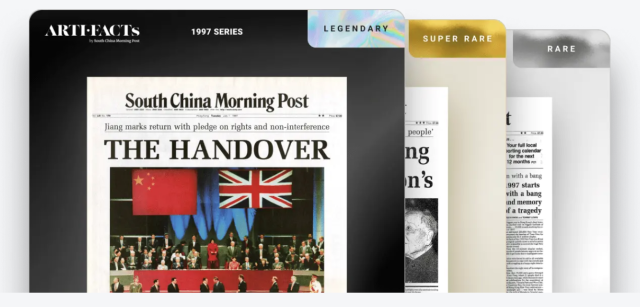The firm Artifact Labs realized the long-term potential of tokenizing historical artifacts and making them immutable and available to the public after an NFT series honoring Hong Kong’s transfer from the U.K. to China produced $260,000 in sales.
The South China Morning Post, the leading English-language publication in Hong Kong that Alibaba purchased for $262 million back in 2015, gave rise to Artifact. A non-fungible token version of each SCMP front page from 1997, the year of Hong Kong’s handover, was part of the company’s initial project. The rarity level of each item was based on how significant a certain day’s events were at the time.
Since breaking away from the parent company last year, the NFT issuer has started a new chapter in its autonomous history. The renowned web3 investing company Animoca Ventures and Hong Kong-based hedge fund manager Blue Pool Capital both contributed to Artifact’s $3.25 million first round of outside fundraising, which was revealed today.
From a strategic standpoint, “Animoca is obviously heavily invested in web3 and believes that NFTs and ownership of digital assets are the future, so we are filling a very nice part of that around collectibles,” the company’s CEO Philip Pon said in an interview with TechCrunch.
After the fundraising round, SCMP has remained a “large” stakeholder, according to Pon.
In order to power its NFT transactions, Artifact collaborates with a small number of outside partners. Its 1997 collection was created on the Flow blockchain using Bloc to wallets, while it is also capable of mounting NFTs on other chains, including Ethereum, Polygon, and BSC.
Additionally, the business has received funds from Filecoin, a decentralized storage system, and Dapper Labs, the firm behind the well-known NFT series NBA Top Shot.
The startup is boosting its internal technical stack as well. It recently bought the source code of Refinable, an NFT infrastructure provider, for an undisclosed amount. The acquisition, according to an announcement, would allow Artifact to develop a decentralized NFT marketplace. The company will also spend the seed funding on adding technical headcount.
Despite choosing the road of the market, Artefact does not perceive itself as a rival to OpenSea, as its emphasis is on conventional institutions. “We are creating a marketplace for cultural organizations and museums.” Even if we respect OpenSea, we are maybe a little more specialized, said Pon.
Developers and initiatives are aggressively advancing the sector in the budding cryptocurrency business, where the fundamental building blocks are still taking shape. In a proposal to Ethereum, Artefact described a new metadata standard for on-chain preservation work.
“Artifact Labs is taking a leadership role in this domain through its innovative integration of blockchain technology, and their newly proposed EIP-6596, which we believe will be an important standard for museums and custodians of culture going forward,” said James Ho, head of Aminocarb Ventures.





